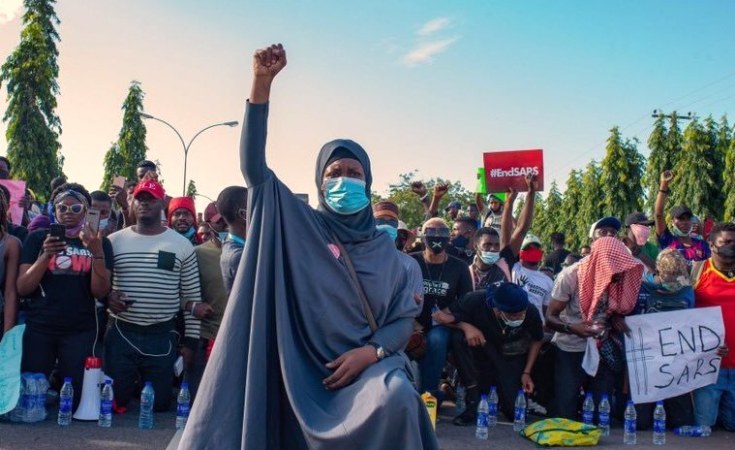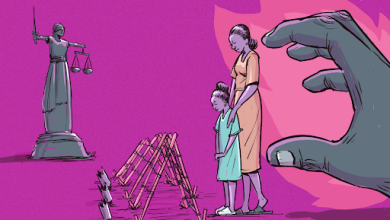How Social Media Became Boardroom For #EndSARS Protests

In the last 10 days, young Nigerians from around the world have come together for peaceful demonstrations across major cities including Lagos, Abuja, London and New York in what has been heralded as one of the largest social movements in the country’s recent history.
These young Nigerians, who are all united by a common goal, have heeded to the clarion call demanding better government for their country’s leaders and its police force, spurring the most unlikely of pairings from all walks of life.
Anchored by a decentralised leadership system where there are no official leaders but a myriad of youths dedicated to the cause, the #EndSARS campaigners are using social media as a tool to fight oppression.
Mainly using Twitter, Facebook and Whatsapp, they have galvanised through private chat rooms and the increasingly popular hashtag #EndSARS to reach communities both near and far.
For instance, when thugs raided Alausa protests with cutlasses and knives to cause chaos among their ranks, women on the frontline like Feyikemi Abudu were able to respond instantly and amplify this message until ambulance services were promptly disbursed.
Ironically, social media, a platform that has been used to imply the youths have become lazy, has turned into their greatest tool for information dissemination and organisation.
The #EndSARS protests have gained so much relevance that it has received endorsements from several influential figures including Jack Dorsey, Twitter’s Chief Executive Officer.
The use of social media for the movement goes beyond first aid reinforcements.
It has also become very efficient in rallying youths to pre-identified locations where various peaceful protests are taking place.
In one such case, Femi* who was largely following the news on traditional media such as the newspapers and televised media houses, was completely uninformed on how heated the police had become with protesters.
It was until a friend advised him to download Twitter that he became aware of the growing tensions and the government’s inability to protect its citizens.
“I downloaded Twitter and found out more information in a few hours than I could find in a day when watching the news”, he says.
It was his move to Twitter that saved the life of a friend later when she was accosted by police and taken to their headquarters.
“I owe a lot to the Feminist Coalition on Twitter,” he tells this reporter, praising the organisation that has quickly risen to the occassion and become the driving force for raising funds for protesters.
The organisation has helped compensate the families of some of the deceased and provided food and water to youths protesting both online and offline.
Sentiments like Femi’s are echoed by many on the frontlines who have easily found the nearest protest locations to them by staying connected to the hashtags and accounts like that of the Feminist Coalition.
The fight clearly cannot be separated from digital media and this can already be seen from the troop of responses and donations from international media and celebrities.
At the end of 2018, Nigeria ranked 7th globally for internet subscribers but the exorbitant prices of data in the country are typically a barrier to the use of social media in a country where more than 40 per cent of its people live in poverty.
This, coupled with the slow digitisation of the country’s major bodies including the police force which has no identifiable data system, the use of social media in this youth-led movement is incredibly noteworthy.
The intensity and tenacity of the protests highlight a key cultural shift in the country – the assurance that the revolution will be televised for the world to see.
Nigerians are speculating that the government, in order to mute the campaign, may clampdown on social media like its counterparts in other African countries have done in the past.
For instance, Chad shut down the internet in early 2018 despite the international media campaigns against the deliberate clamp down on free speech in the landlocked African country.
Chad is not the only African country where the government’s censorship of digital rights was used to stifle freedom of speech.
Between 2016 and 2018, the authorities in South Sudan, Cameroon, Ethiopia, and Somalia also shut down the internet in their respective countries.
While Zimbabwe, Sudan, and the Democratic Republic of Congo have forced internet shutdowns in 2019, Tanzania, Uganda, and a host of North African countries have stringent subsisting rules for the use of social media and digital publishing.
Nigeria almost moved in that direction in 2019 as law that sought to punish individuals behind certain social media posts which was proposed to the Nigerian Senate in 2017 passed first reading.
Massive media backlash prevented lawmakers from passing the bill into law.
Lade*, a tech lawyer out to protest tells this reporter that if the government shuts down the internet then Nigerian youths will shut down the country further.
Seeing as people have already shut down major toll gates in Lagos, a nationwide shut down does not seem too far off but with the steady increase of protesters by the day, the government will have a forced to be reckoned with this social media generation.
In any case, people like Gbenga Sesan, the owner of a social and communications firm, Paradigm Shift Initiative have launched a campaign offering VPN connections for people in the event that these decisions are true.
With social media as their most important tool, it is hard to imagine a world where the pain of many young Nigerians would remain ignored or contested by the rest of the world and with a dedication to documenting both the good and bad from the protests, victory is surely on the horizon.
*Names have been changed to protect respondents’ identities.
(Tami Makinde is a journalist at the NATIVE Mag. This report was supported by the Gatefield Impact mini-grant for journalists)
Support Our Journalism
There are millions of ordinary people affected by conflict in Africa whose stories are missing in the mainstream media. HumAngle is determined to tell those challenging and under-reported stories, hoping that the people impacted by these conflicts will find the safety and security they deserve.
To ensure that we continue to provide public service coverage, we have a small favour to ask you. We want you to be part of our journalistic endeavour by contributing a token to us.
Your donation will further promote a robust, free, and independent media.
Donate HereStay Closer To The Stories That Matter




